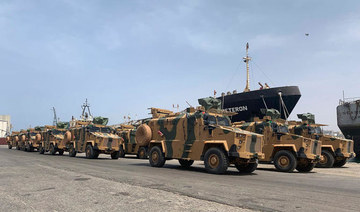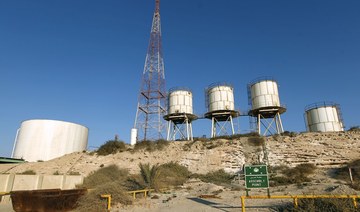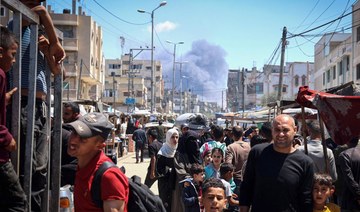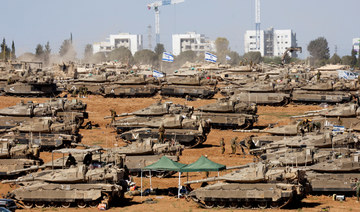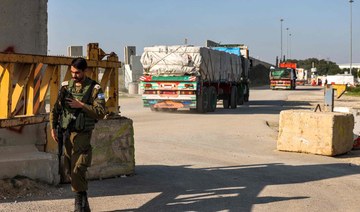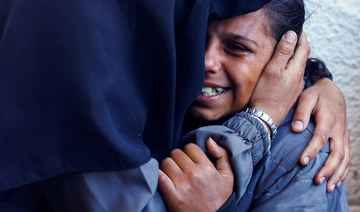BENGHAZI: After years of assassinations, bombings and militia firefights, Libya’s eastern city of Benghazi finally feels safe again — but security has come at a heavy cost.
Uniformed police are out at major intersections, cafes and restaurants stay open late into the night, and local groups hold art exhibitions and festivals. But the city center lies in ruins, thousands remain displaced, and forces loyal to commander Khalifa Haftar, who now controls eastern Libya, have cracked down on dissent.
Benghazi offers a glimpse of what may befall the capital, Tripoli, where Haftar’s forces launched an offensive last month against rival militia loosely allied with a weak, UN-recognized government. Its fate could also harden the resolve of Haftar’s opponents — who view him as an aspiring dictator — and further imperil UN efforts to peacefully reunite the country.
Haftar’s forces have met stiff resistance on the outskirts of Tripoli, and experts say that despite considerable international support, he is unlikely to succeed in defeating his rivals in the west or unifying the country. They point out that even in the east, his forces rely on local militia as well as Salafists.
Benghazi was the epicenter of the Arab Spring uprising in 2011 that toppled and killed long-ruling dictator Muammar Qaddafi. But in the years after his ouster, the city and much of the country came to be ruled by a patchwork of armed groups: local and tribal militias, nationalist and mainstream extremist groups, as well as Al-Qaeda and Daesh. Extremists attacked the US Consulate in Benghazi on September 11, 2012, killing US Ambassador Chris Stevens and three other Americans.
Haftar served as a senior officer under Qaddafi but defected in the 1980s during the ruinous war with Chad, in which he and hundreds of soldiers were captured in an ambush. He later spent more than two decades in the suburbs of Washington, where he is widely believed to have worked with the CIA, before returning to join the uprising in 2011. He eventually built up forces known as the Libyan National Army.
In February 2014, he declared the start of an operation to root out the militia and unify the country. Four months later, when it appeared they would lose influence in a disputed election, extremist and other factions in Tripoli launched an attack on their rivals, eventually splitting the country into rival authorities in the east and west, each beholden to an array of militia6.
“Back to normal”
Haftar’s prominence rose as his forces battled extremists and other rival factions across eastern Libya, and the parliament there eventually recognized him as the head of its armed forces, giving him the rank of field marshal.
He also gained the support of Egypt and the United Arab Emirates, as well as France and Russia, all of which came to see him as a key ally against extremists and are widely believed to have provided weapons and other support despite a UN arms embargo. His opponents in western Libya are believed to have gotten aid from Qatar and Turkey.
Today his forces are firmly in control of the country’s east, and the near-daily assassinations, abductions and shootings that once terrified Benghazi’s residents are a thing of the past. Billboards and posters showing Haftar in full military regalia line the streets — with so many placed along the airport road that many jokingly refer to the display as Haftar’s Instagram page.
“In 2019 we have recorded no terrorist attacks or assassinations in Benghazi, which was a daily event back before the LNA took control over the city,” said Maj. Tarek Alkarraz, spokesman for the Interior Ministry in the east. He added that the city of Derna, which was under Daesh control, was similar. “Now life is back to normal and it’s safe and secure.”
Streets are cleaner, garbage is being collected and the electricity cuts out far less often than it did at the height of the fighting. Outside the devastated city center, modern shopping malls have sprung up, as well as upscale seafood and Turkish restaurants. Local ride-booking services are modeled on Uber and Careem.
“The only thing that matters is safety, which we are enjoying, thank God,” said Wanees Amgadah, a retired teacher. “The whole east, and God willing even the west, will be safe with the help of God, thanks to our soldiers.”
Inspired by Egypt’s El-Sisi
Haftar has modeled his rule on that of President Abdel-Fattah El-Sisi, his close ally in neighboring Egypt, who led the overthrow of an elected but divisive president in 2013. Both have declared war on terrorism. El-Sisi has launched an unprecedented crackdown on dissent, jailing thousands of people and heavily restricting independent media and civil society.
“The LNA primarily emphasize stability and deem the Muslim Brotherhood and their allies and associates as a security threat,” said Claudia Gazzini, a Libya expert at the International Crisis Group. “This is a very vague term and this brand could be slapped on anyone who opposes the LNA.”
A human rights activist in Benghazi, who spoke on condition of anonymity for fear of reprisal, said the security forces are more aggressive than at any point since Qaddafi’s time, restricting the movement of activists and NGO workers, and regularly bringing them in for interrogation.
In a report issued last month, the Tripoli-based Libyan Center for Freedom of the Press documented 29 attacks on reporters by Haftar’s forces over the past year and a half, more than any other armed group. Haftar’s forces “prohibit all the media and journalists who are not loyal to it, and thus totally curtail all civilian state aspects in eastern Libya,” it said.
The report said more than 80 journalists have fled the country since 2014. Across Libya, it said, “journalists now face one of three options: to work under threat, or observe silence and not talk about the threats they face, or abandon their profession.”
Haftar’s supporters insist the LNA is not seeking to rule the country, but to rebuild the state and create the conditions for elected government.
“Our goal is not to rule or to establish a military government,” Abdulhadi Lahweej, the foreign minister in the eastern government, told The Associated Press earlier this month. “We want a civil state based on institutions and human rights. We want a government that the Libyan people choose and we will approve of whatever the people choose.”
Egypt has also held elections under El-Sisi, but they resulted in a parliament packed with his supporters, which earlier this year approved constitutional changes allowing him to potentially remain in office until 2030. El-Sisi was re-elected last year in a vote in which all potentially serious competitors were either arrested or pressured into withdrawing from the race.
After years of unrest, many Libyans may prefer that kind of stability.
“Is it possible to achieve democracy in the presence of two and a half million weapons?” asks Ahmed Almahdawi, an independent political analyst based in Benghazi. “I don’t think so.”
Younis Fanoush, a Benghazi lawmaker who recently helped launch an independent political party backing the LNA, said the only hope of establishing a civil state is to first defeat the militia.
He says the armed groups “chose to destroy any hope for establishing a democratic state and drafting a constitution. Now the only way is forward, and this war is a must to remove these cancerous entities from the capital.”
Haftar’s rule brings security to eastern Libya, at a cost
Haftar’s rule brings security to eastern Libya, at a cost
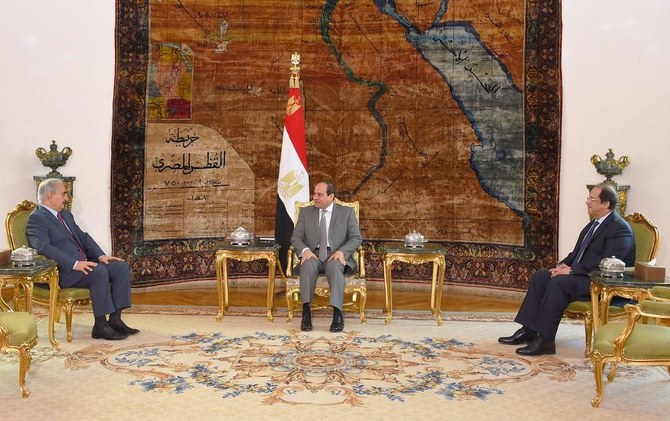
- Haftar’s rivals see him as a dictator who is hoping to rule
- He worked with Qaddafi until he defected in 1980s
South Gaza hospitals have only three days’ fuel left: WHO

Despite international objections, Israel sent tanks into the overcrowded southern city of Rafah on Tuesday and seized the nearby crossing into Egypt that is the main conduit for aid into the besieged Palestinian territory.
“The closure of the border crossing continues to prevent the UN from bringing fuel. Without fuel all humanitarian operations will stop. Border closures are also impeding delivery of humanitarian aid into Gaza,” WHO Director General Tedros Adhanom Ghebreyesus said on X, formerly Twitter.
“Hospitals in the south of Gaza only have three days of fuel left, which means services may soon come to a halt.”
Tedros said Al-Najjar, one of the three hospitals in Rafah, was no longer functioning due to the ongoing hostilities in the vicinity and the military operation in Rafah.
“At a time when fragile humanitarian operations urgently require expansion, the Rafah military operation is further limiting our ability to reach thousands of people who have been living in dire conditions without adequate food, sanitation, health services and security,” he said.
“This must stop now.”
The Geneva-based WHO is the UN’s health agency.
Israel bombarded Rafah on Wednesday as talks resumed in Cairo aimed at agreeing the terms of a truce in the seven-month war.
Gaza’s bloodiest-ever war began following Hamas’s unprecedented October 7 attack on Israel that resulted in the deaths of more than 1,170 people, mostly civilians, according to an AFP tally of Israeli official figures.
Vowing to destroy Hamas, Israel has conducted a retaliatory offensive that has killed more than 34,800 people in Gaza, mostly women and children, according to the Hamas-run territory’s health ministry.
Egypt police probe murder of Israeli-Canadian businessman
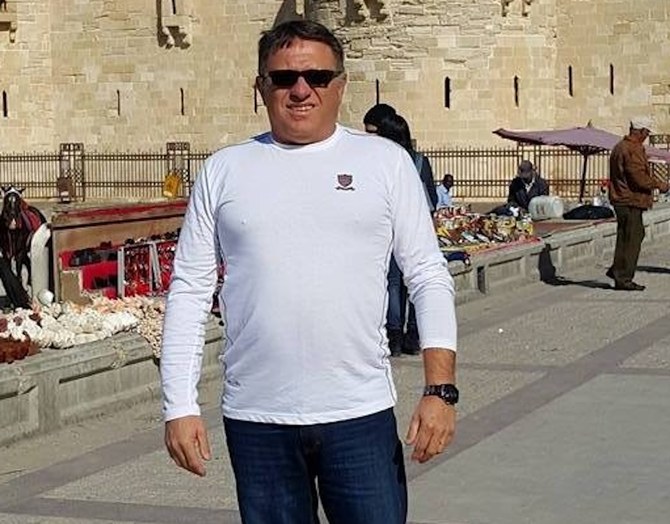
- Security sources made no link between the shooting and the dead man’s ethnic background
CAIRO: Egypt’s interior ministry said it had launched an investigation Wednesday after an Israeli-Canadian businessman was shot dead in the coastal city of Alexandria.
A police statement said the man, “a permanent resident of the country” was shot dead on Tuesday.
The Israeli foreign ministry said the murdered man was a businessman with dual Canadian-Israeli citizenship.
“He had a business in Egypt. The Israeli embassy in Cairo is in contact with the Egyptian authorities, who are investigating the circumstances of the case,” the ministry said.
Attacks on Israelis in Egypt are rare but not unprecedented.
On October 8, the day after Hamas attacked Israel triggering war in Gaza, an Egyptian policeman shot dead two Israeli tourists and their Egyptian guide.
Following their deaths, Israeli authorities advised its nationals in Egypt to leave “as soon as possible.”
Egypt was the first Arab country to sign a peace treaty with Israel but relations between the two peoples have never been warm.
The Egyptian government has often acted as mediator in flare-ups in the Israeli-Palestinian conflict that have threatened to stir up passions on the street.
Israel pounds Gaza as truce talks resume in Cairo
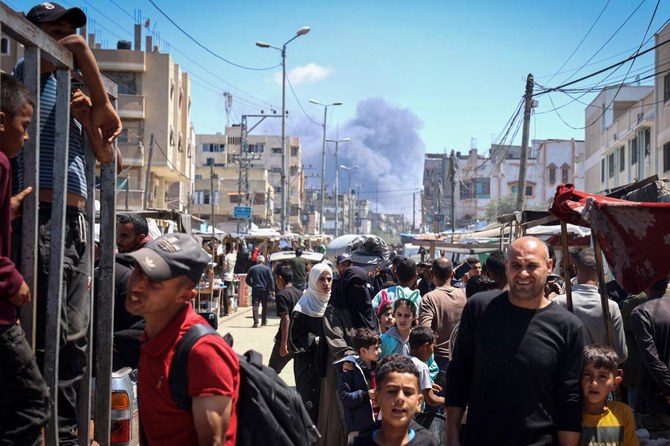
- AlQahera News: ‘Truce negotiations have resumed in Cairo today with all sides present’
- Moscow so far sees no prospect for a peace settlement in Gaza or the wider Middle East
RAFAH, Palestinian Territories: Israel bombarded the overcrowded Gaza city of Rafah, where it has launched a ground incursion, as talks resumed Wednesday in Cairo aimed at agreeing the terms of a truce in the seven-month war.
Despite international objections, Israel sent tanks into Rafah on Tuesday and seized the nearby crossing into Egypt that is the main conduit for aid into the besieged Palestinian territory.
The White House condemned the interruption to humanitarian deliveries, with a senior US official later revealing Washington had paused a shipment of bombs last week after Israel failed to address US concerns over its Rafah plans.
The Israeli military said hours later it was reopening another major aid crossing into Gaza, Kerem Shalom, as well as the Erez crossing.
But the UN agency for Palestinian refugees, UNRWA, said the Kerem Shalom crossing — which Israel shut after a rocket attack killed four soldiers on Sunday — remained closed.
It came after a night of heavy Israeli strikes and shelling across Gaza. AFPTV footage showed Palestinians scrambling in the dark to pull survivors, bloodied and caked in dust, out from under the rubble of a Rafah building.
Russia said on Wednesday that the war in Gaza was escalating due to Israel’s incursion into Rafah and that Moscow so far saw no prospect for a peace settlement in Gaza or the wider Middle East.
“An additional destabilizing factor, including for the entire region, was the launch of an Israeli military ground operation in Rafah,” Russian Foreign Ministry Spokeswoman Maria Zakharova told reporters.
“About one and a half million Palestinian civilians are concentrated there. In this regard, we demand strict compliance with the provisions of international humanitarian law.”
Speaking more broadly about efforts to find a lasting settlement in the Middle East, Zakharova said: “I would like to call it a settlement, but, alas, it is far from a settlement.”
“There are no prospects for resolving the situation in the Gaza Strip. On the contrary, the situation in the conflict zone is escalating daily.”
“We are living in Rafah in extreme fear and endless anxiety as the occupation army keeps firing artillery shells indiscriminately,” said Muhanad Ahmad Qishta, 29.
“Rafah is a witnessing a very large displacement, as places the Israeli army claims to be safe are also being bombed,” he said.
The Gaza war was sparked by Hamas’s unprecedented October 7 attack on Israel, which resulted in the deaths of more than 1,170 people, mostly civilians, according to an AFP tally of Israeli official figures.
Israel in response vowed to crush Hamas and launched a military offensive that has killed at least 34,789 people in Gaza, mostly women and children, according to the Hamas-run territory’s health ministry.
Militants also took around 250 people hostage, of whom Israel estimates 128 remain in Gaza, including 36 who are believed to be dead.
Talks aimed at agreeing a ceasefire resumed in Cairo on Wednesday “in the presence of all parties,” Egyptian media reported.
A senior Hamas official said the latest round of negotiations would be “decisive.”
“The resistance insists on the rightful demands of its people and will not give up any of our people’s rights,” he said on condition of anonymity because he was not authorized to speak publicly on the negotiations.
The official had previously warned it would be Israel’s “last chance” to free the scores of hostages still in militants’ hands.
Mediators have failed to broker a new truce since a week-long ceasefire in November saw 105 hostages freed, the Israelis among them in exchange for Palestinian prisoners held by Israel.
Mediator Qatar urges international community to prevent Rafah ‘genocide’
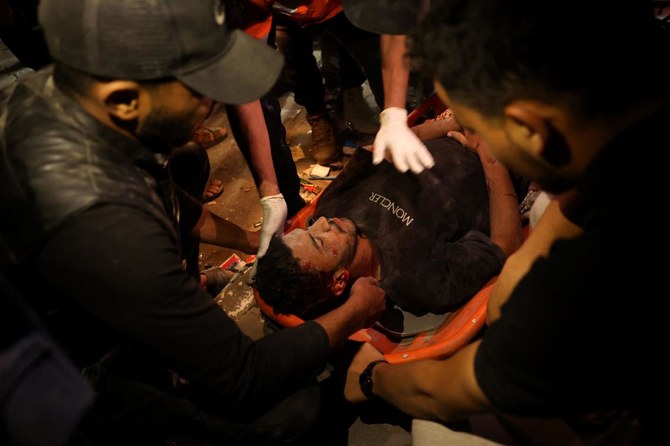
- Israel struck targets in the Gaza Strip on Wednesday after seizing the main border crossing with Egypt
- African Union condemns the Israeli military’s moves into southern Gaza’s Rafah
DOHA: Qatar called on the international community on Wednesday to prevent a “genocide” in Rafah following Israel’s seizure of the Gaza city’s crossing with Egypt and threats of a wider assault.
In a statement the Gulf state, which has been mediating between Israel and militant group Hamas, appealed “for urgent international action to prevent the city from being invaded and a crime of genocide being committed.”
Israel struck targets in the Gaza Strip on Wednesday after seizing the main border crossing with Egypt. Israel has vowed for weeks to launch a ground incursion into Rafah, despite a clamour of international objection.
The attacks on the southern city, which is packed with displaced civilians, came as negotiators and mediators met in Cairo to try to hammer out a hostage-release and truce deal in the seven-month war.
Qatar, which has hosted Hamas’s political office in Doha since 2012, has been engaged — along with Egypt and the United States — in months of behind-the-scenes mediation between Israel and the Palestinian group.
The African Union condemned Wednesday the Israeli military’s moves into southern Gaza’s Rafah, calling for the international community to stop “this deadly escalation” of the war.
AU Commission chief Moussa Faki Mahamat “firmly condemns the extension of this war to the Rafah crossing,” said a statement after Israeli tanks captured the key corridor for humanitarian aid into the besieged Palestinian territory.
Faki “expresses his extreme concern at the war undertaken by Israel in Gaza which results, at every moment, in massive deaths and systematic destruction of the conditions of human life,” the statement said.
“He calls on the entire international community to effectively coordinate collective action to stop this deadly escalation.”
Israel says it has reopened Kerem Shalom border crossing for Gaza aid
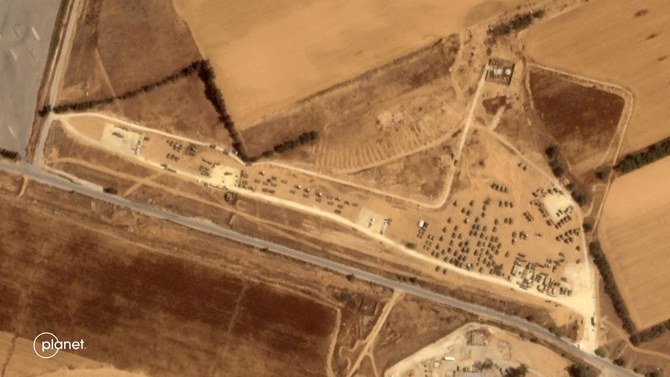
- Erez border crossing between Israel and northern Gaza is also open for aid deliveries into the Palestinian territory
JERUSALEM: Israel said it reopened the Kerem Shalom border crossing to humanitarian aid for Gaza Wednesday, four days after closing it in response to a rocket attack that killed four soldiers.
“Trucks from Egypt carrying humanitarian aid, including food, water, shelter equipment, medicine and medical equipment donated by the international community are already arriving at the crossing,” the army said in a joint statement with COGAT, the defense ministry body that oversees Palestinian civil affairs.
The supplies will be transferred to the Gaza side of the crossing after undergoing inspection, it added.
The statement said the Erez border crossing between Israel and northern Gaza is also open for aid deliveries into the Palestinian territory.
The Kerem Shalom crossing was closed after a Hamas rocket attack killed four soldiers and wounded more than a dozen on Sunday.
On Tuesday, Israeli troops seized control of the Palestinian side of the Rafah crossing between Gaza and Egypt after launching an incursion into the eastern sector of the city.
The United Nations and Israel’s staunchest ally the United States both condemned the closure of the two crossings which are a lifeline for civilians facing looming famine.



